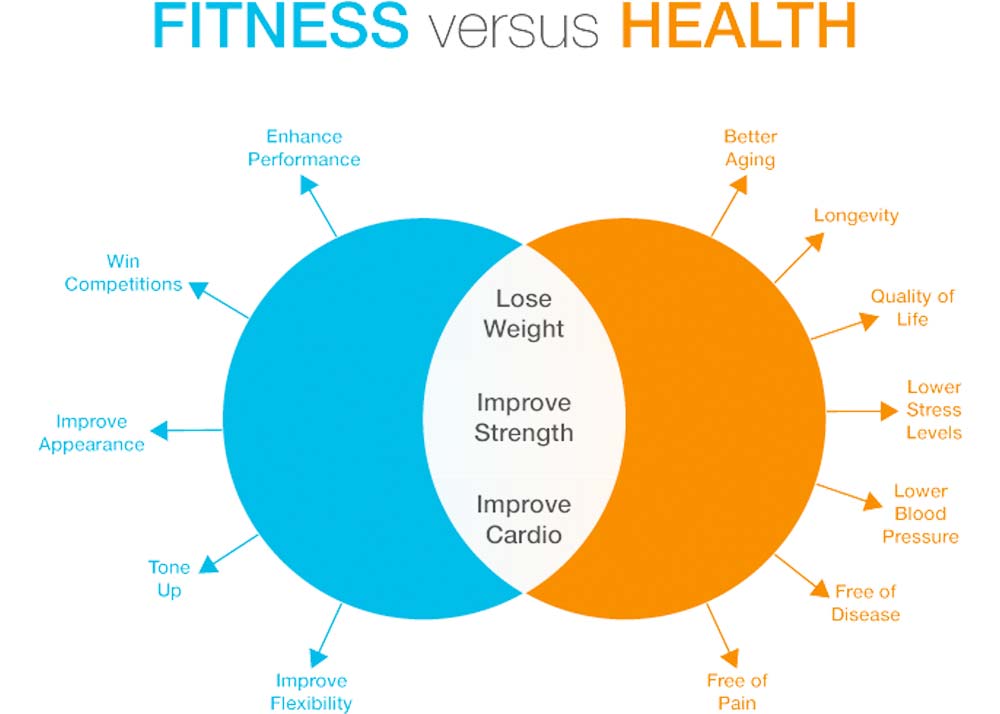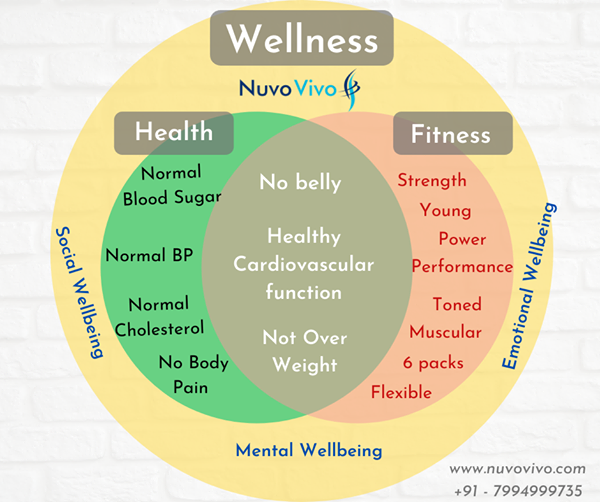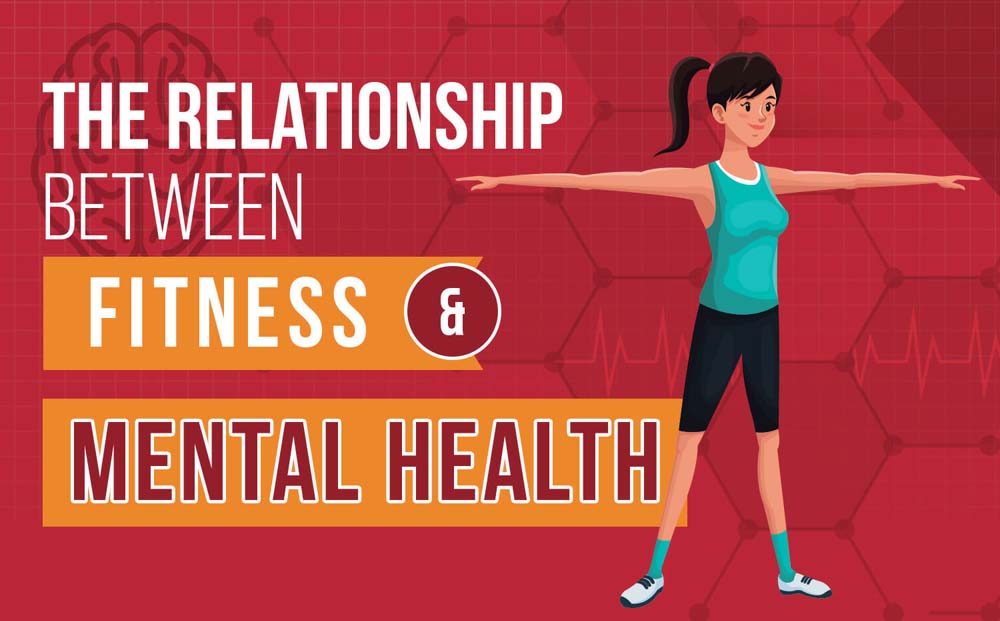The Interrelation Between Fitness, Health, and Wellness
Are you curious about the connection between fitness, health, and wellness? It turns out, these three concepts are closely intertwined, each impacting and influencing the other. As you embark on your personal journey to improve your physical well-being, understanding the interrelation between fitness, health, and wellness will guide you towards a more holistic approach to your overall well-being. By delving into the correlations between these three aspects, you can unlock a deeper understanding of how they work cohesively to create a balanced and thriving life. So, let’s dive in and explore the fascinating relationship between fitness, health, and wellness.

Physical Fitness
Physical fitness refers to the overall condition of your body and its ability to perform physical activities. It is not limited to just being able to run fast or lift heavy weights, but encompasses various aspects such as cardiovascular endurance, muscular strength, flexibility, and body composition. Being physically fit has numerous benefits and is crucial for maintaining good health.
Benefits of Physical Fitness
Engaging in regular physical exercise and improving your physical fitness level can bring about a wide range of benefits. Firstly, it helps to improve your cardiovascular health by strengthening your heart and improving blood circulation. This reduces the risk of heart disease, high blood pressure, and stroke.
Secondly, physical fitness helps to maintain a healthy body weight. Regular exercise, combined with a balanced diet, helps to burn calories and control weight. This can prevent obesity and related health issues such as diabetes and joint problems.
Thirdly, physical fitness plays a crucial role in enhancing muscle strength and flexibility. Strength training exercises, such as weightlifting, help to build and strengthen muscles, leading to improved movement and posture. Flexibility exercises, such as stretching, increase joint mobility and reduce the risk of injuries.
Finally, physical fitness can positively impact mental health. Regular exercise stimulates the release of endorphins, also known as “feel-good” hormones, which can reduce stress, anxiety, and depression. It also promotes better sleep and boosts cognitive function.
Relationship between Physical Fitness and Health
Physical fitness and overall health are closely intertwined. Engaging in regular physical activity and maintaining good physical fitness levels can significantly contribute to better health outcomes. Physical fitness reduces the risk of chronic diseases such as heart disease, diabetes, and certain types of cancer. It also improves respiratory function, bone density, and immune system function.
Additionally, physical fitness enhances mental health by reducing symptoms of stress, anxiety, and depression. It can improve self-esteem and body image, leading to a more positive outlook on life. Regular exercise can also aid in better sleep, which is crucial for overall well-being.
Maintaining physical fitness through exercise and an active lifestyle is an essential component of overall wellness and plays a key role in achieving optimal health.
Mental Fitness
Mental fitness refers to the state of your mental well-being and the ability to effectively cope with daily stressors, challenges, and emotions. It involves having a positive mindset, strong cognitive abilities, and emotional resilience. Just as physical fitness is vital for overall health, mental fitness is equally important and contributes to overall wellness.
Benefits of Mental Fitness
Improving your mental fitness has numerous benefits for your overall well-being. Firstly, it enhances cognitive function and performance. Regular mental exercises such as puzzles, reading, and learning new skills help to maintain and improve memory, attention, and problem-solving abilities. This can result in better productivity and success in various aspects of life.
Secondly, mental fitness helps to manage stress and build emotional resilience. Developing healthy coping mechanisms and emotional regulation skills allows you to handle stressors more effectively, reducing the risk of mental health issues such as anxiety and depression. It also promotes a positive mindset and overall emotional well-being.
Thirdly, mental fitness positively influences social interactions and relationships. When you are mentally fit, you tend to have better communication skills, empathy, and emotional intelligence. This leads to more fulfilling relationships and a stronger support system.
Relationship between Mental Fitness and Health
Mental fitness plays a crucial role in overall health and well-being. Poor mental health can negatively impact physical health and increase the risk of various ailments. Stress, anxiety, and depression can lead to sleep disturbances, weakened immune function, and digestive problems. They can also contribute to unhealthy coping mechanisms such as smoking, excessive alcohol consumption, or poor dietary choices, further compromising physical health.
On the other hand, improving mental fitness through various strategies such as mindfulness, therapy, and self-care can have significant positive effects on physical health. It can improve sleep quality, boost the immune system, and enhance overall bodily functions.
Cultivating mental fitness is essential for overall wellness, as it allows you to not only navigate the challenges of life but also experience joy, fulfillment, and better physical health.
Emotional Wellness
Emotional wellness refers to the ability to recognize, understand, and effectively manage emotions in a healthy and positive manner. It involves having a strong sense of self-awareness, empathy, and the ability to maintain satisfying relationships. Emotional wellness is a key component of overall well-being and impacts various aspects of life.
Benefits of Emotional Wellness
Cultivating emotional wellness brings numerous benefits to your overall health and well-being. Firstly, it allows for better self-awareness and understanding of your own emotions. This enables you to identify and address any emotional imbalances or triggers, leading to improved emotional regulation and overall mental health.
Secondly, emotional wellness enhances relationships and social interactions. When you are emotionally well, you tend to have healthier and more satisfying relationships with others. You are able to empathize, communicate effectively, and establish boundaries, resulting in stronger connections and support systems.
Thirdly, emotional wellness promotes resilience and the ability to cope with stress and change. It provides you with the tools to navigate difficult situations and bounce back from setbacks. This resilience also extends to physical health, as prolonged emotional stress can weaken the immune system and increase the risk of various health issues.
Relationship between Emotional Wellness and Health
Emotional wellness significantly impacts physical health and overall well-being. Unmanaged stress, negative emotions, and poor emotional regulation can negatively affect physical health. Chronic stress can lead to increased blood pressure, weakened immune function, and digestion problems. It can also contribute to unhealthy behaviors such as overeating or substance abuse, which further compromise health.
Conversely, cultivating emotional wellness through practices such as self-care, therapy, and healthy coping mechanisms positively impacts physical health. Effective stress management improves immune function, reduces the risk of chronic diseases, and enhances overall bodily functions. Emotional wellness also promotes better sleep, cognitive function, and overall vitality.
Understanding and prioritizing emotional wellness is essential for maintaining optimal health and overall wellness. It allows you to develop resilience, build fulfilling relationships, and navigate the challenges of life in a healthy and positive manner.
Nutrition and Wellness
Proper nutrition is a cornerstone of overall wellness. It refers to the intake of essential nutrients through a balanced diet to support the body’s growth, repair, and maintenance. Nutrition plays a vital role in physical fitness, mental health, and overall well-being.
Importance of Nutrition in Wellness
Nutrition is crucial for overall wellness as it provides the body with the necessary fuel and building blocks to function optimally. A balanced diet that includes a variety of nutrients, such as carbohydrates, proteins, healthy fats, vitamins, and minerals, supports physical health, mental function, and emotional well-being.
Proper nutrition is essential for maintaining physical fitness. It helps to fuel physical activities, enhance muscle development, and promote overall bodily functions. A well-nourished body is more capable of engaging in regular exercise and recovering from physical exertion.
Nutrition also has a direct impact on mental health. Certain nutrients, such as omega-3 fatty acids and B vitamins, are crucial for brain function and the production of neurotransmitters that regulate mood and cognition. A balanced diet that includes these nutrients can help to improve mental function and well-being.
Relationship between Nutrition and Fitness
Nutrition and fitness are closely intertwined. Proper nutrition is essential for fueling physical activities, repair and growth of muscles, and supporting overall fitness goals. Adequate intake of macronutrients and micronutrients provides the energy and nutrients needed for physical performance.
Consuming a balanced diet that includes carbohydrates, proteins, and healthy fats ensures that the body has the necessary fuel for high-intensity workouts and endurance exercises. Carbohydrates provide energy, proteins support muscle growth and repair, and healthy fats aid in hormone production and absorption of fat-soluble vitamins.
Additionally, nutrition plays a role in body composition. To achieve desired fitness goals, such as building muscle or losing fat, it is important to consume adequate protein, manage calorie intake, and maintain a balanced diet. Proper nutrition allows the body to function optimally during exercise and recover effectively afterward.
Relationship between Nutrition and Health
Nutrition has a profound impact on overall health. A diet that lacks essential nutrients, is high in processed foods, or contains excessive calories can contribute to various health issues. Poor nutrition can increase the risk of chronic diseases such as heart disease, diabetes, obesity, and certain types of cancer.
Conversely, a balanced diet that meets the body’s nutritional needs promotes better health outcomes. Adequate intake of vitamins, minerals, fiber, and antioxidants helps to support immune function, reduce inflammation, and prevent nutrient deficiencies. This, in turn, reduces the risk of chronic diseases and supports overall health and well-being.
Promoting proper nutrition through education, access to healthy food options, and encouraging balanced dietary choices is crucial for maintaining optimal health and overall wellness.

Social Fitness
Social fitness refers to your ability to interact and connect with others in a positive and meaningful way. It involves having satisfying relationships, effective communication skills, and a strong support system. Social fitness plays a crucial role in overall well-being and contributes to a healthier and happier life.
Definition of Social Fitness
Social fitness can be defined as the level of competence and comfort you have in social interactions and relationships. It encompasses various skills such as active listening, empathy, conflict resolution, and establishing healthy boundaries. Being socially fit means being able to form and maintain meaningful connections with others.
Benefits of Social Fitness
Developing and maintaining social fitness brings numerous benefits to overall well-being. Firstly, it enhances emotional well-being and provides a sense of belonging and connectedness. Having a strong support system and meaningful relationships can reduce feelings of loneliness and isolation, promoting better mental health.
Secondly, social fitness positively impacts physical health. Research has shown that individuals with strong social connections tend to have lower rates of chronic diseases, faster recovery from illnesses, and increased longevity.
Thirdly, social fitness contributes to personal growth and self-confidence. Engaging in social activities, meeting new people, and forming connections allows for personal development and expansion of one’s social circle. It also provides opportunities for learning, collaboration, and exposure to different perspectives.
Relationship between Social Fitness and Wellness
Social fitness is an essential component of overall wellness as it influences various aspects of life. Relationships and social interactions impact emotional well-being, mental health, and physical health.
Having satisfying relationships and social support promotes emotional wellness by providing a sense of belonging, connection, and validation. It allows for meaningful emotional exchanges, decreases stress levels, and enhances overall happiness.
Social fitness also contributes to mental health by reducing the risk of mental health issues such as depression and anxiety. Building and maintaining strong relationships fosters a sense of purpose, self-worth, and personal growth. It provides opportunities for social activities, mutual support, and stress relief, all of which positively impact mental well-being.
Furthermore, social fitness influences physical health by reducing the risk of chronic diseases and promoting healthy behaviors. Being socially active encourages participation in physical activities, improves sleep quality, and provides a support system for adopting healthy habits such as regular exercise and balanced nutrition.
Prioritizing social fitness and nurturing relationships is essential for overall wellness. It allows for positive emotional experiences, personal growth, and a network of support, contributing to a healthier and more fulfilling life.
Environmental Health
Environmental health refers to the impact of the natural and built environment on physical health and overall well-being. It encompasses factors such as air and water quality, access to green spaces, and exposure to hazards. The environment we live in can greatly influence our fitness and wellness.
Definition of Environmental Health
Environmental health focuses on how environmental factors, both natural and man-made, affect human health. This includes air pollution, water contamination, exposure to toxic substances, noise pollution, and access to safe and clean environments. Environmental health also considers the impact of climate change, ecosystems, and physical surroundings on human well-being.
Effects of Environmental Factors on Fitness and Wellness
The environment we live in can significantly impact our fitness and overall wellness. Poor air quality, for example, can lead to respiratory problems and reduce lung function, making physical activity more challenging. Exposure to contaminants in water or food can result in digestive issues, weakened immune system, and other health problems, affecting overall fitness.
Access to green spaces and a clean environment can promote physical fitness by encouraging outdoor activities, such as walking, jogging, or cycling. Nature has been shown to have a positive impact on mental health, reducing stress levels, improving mood, and enhancing cognitive function. Conversely, living in a polluted or noisy environment can contribute to increased stress, anxiety, and negatively impact overall well-being.
Additionally, exposure to environmental hazards and unsafe living conditions can have detrimental effects on fitness and wellness. High levels of noise pollution can disrupt sleep patterns, leading to sleep disturbances and fatigue. Hazardous substances, such as asbestos or lead, can pose significant health risks and impair overall well-being.
Relationship between Environmental Health and Wellness
Environmental health is closely linked to overall wellness. A clean and healthy environment supports physical fitness, mental well-being, and reduces the risk of various health problems.
Clean air, water, and access to green spaces promote physical fitness by providing opportunities for outdoor activities and reducing exposure to pollutants that can have adverse effects on health. A clean environment reduces the risk of respiratory issues, allergies, and other health problems, allowing for optimal physical functioning and overall well-being.
Furthermore, a healthy environment positively impacts mental health. Being surrounded by natural environments and having access to green spaces promotes relaxation, reduces stress levels, and improves overall mood and mental well-being. It also provides opportunities for physical activity, social interactions, and increased cognitive function.
Living in an environment free from hazards and toxic substances is crucial for overall wellness. Exposure to pollutants or unsafe living conditions can have severe health consequences and impair physical and mental well-being. Protecting and improving environmental health is essential for maintaining optimal fitness and overall wellness.
Occupational Wellness
Occupational wellness refers to the satisfaction and fulfillment you derive from your work or occupation. It involves finding a sense of purpose, balance, and enjoyment in your professional life. Occupational wellness plays a significant role in overall wellness and can have profound effects on both physical and mental health.
Definition of Occupational Wellness
Occupational wellness encompasses various aspects of work-related satisfaction and fulfillment. It involves having a clear sense of purpose, finding a balance between work and personal life, and enjoying the activities and responsibilities associated with your profession. Occupational wellness is not solely limited to job satisfaction but also includes factors such as work-life balance, career development, and a positive work environment.
Importance of Occupational Wellness for Fitness
Occupational wellness is crucial for maintaining overall fitness and well-being. Finding fulfillment and satisfaction in your work positively impacts various aspects of your life, including physical fitness.
When you enjoy your work and have a sense of purpose, you are more likely to experience lower stress levels and better mental health. Stress from work can have detrimental effects on physical health, contributing to issues such as elevated blood pressure, weakened immune system, and cardiovascular problems. Occupational wellness, therefore, helps to mitigate the negative impact of stress on physical fitness.
Additionally, occupational wellness influences lifestyle choices and behaviors. Finding balance between work and personal life allows for more time and energy to engage in physical activities, maintain healthy habits, and prioritize self-care. A positive work environment that promotes physical activity, well-being programs, and encourages healthy behaviors can also contribute to improved physical fitness.
Effects of Occupational Wellness on Health
Occupational wellness has significant effects on overall health and well-being. Job satisfaction and fulfillment positively impact mental health by reducing stress, improving self-esteem, and promoting a positive mindset. A fulfilling occupation can enhance overall life satisfaction, leading to better emotional well-being and mental resilience.
On the physical health front, occupational wellness plays a role in stress management. Job-related stress can contribute to various health issues such as high blood pressure, heart disease, and musculoskeletal problems. Finding satisfaction in your work and maintaining a healthy work-life balance reduces the risk of these health problems and supports overall physical fitness.
Creating a positive work environment that fosters occupational wellness can also lead to increased productivity, better job performance, and improved job satisfaction. This, in turn, promotes higher self-esteem and overall life satisfaction, further benefiting physical and mental health.
Prioritizing occupational wellness through activities such as finding fulfillment in your work, maintaining work-life balance, and creating a positive work environment is essential for overall fitness and well-being.
Intellectual Wellness
Intellectual wellness refers to the ability to engage in critical thinking, continuous learning, and intellectual pursuits. It involves expanding knowledge, stimulating creativity, and developing problem-solving skills. Intellectual wellness is a crucial component of overall well-being and contributes to personal growth and fulfillment.
Definition of Intellectual Wellness
Intellectual wellness encompasses various aspects of mental engagement and active learning. It involves seeking opportunities for intellectual growth, expanding knowledge and skills, and improving cognitive abilities. Intellectual wellness also involves being open to new ideas, critical thinking, and embracing challenges.
Benefits of Intellectual Wellness
Cultivating intellectual wellness brings about numerous benefits for overall well-being. Firstly, it stimulates cognitive function and mental sharpness. Engaging in intellectual activities such as reading, learning new skills, or solving puzzles helps to keep the mind active and promotes cognitive flexibility and creativity.
Secondly, intellectual wellness expands knowledge and understanding of the world. Continuous learning and intellectual pursuits broaden perspectives, enhance problem-solving skills, and stimulate curiosity. This not only promotes personal growth but also provides the tools to navigate challenges and make informed decisions.
Thirdly, intellectual wellness contributes to emotional well-being. Engaging in intellectually stimulating activities can be enjoyable and fulfilling, leading to a sense of accomplishment and increased self-confidence. It can also foster a positive mindset and reduce the risk of cognitive decline later in life.
Relationship between Intellectual Wellness and Fitness
Intellectual wellness and fitness are interrelated, as engaging in intellectual activities and continuous learning positively impact overall fitness and well-being.
Mental fitness, which includes intellectual wellness, improves cognitive function and enhances memory, attention, and problem-solving abilities. This supports mental sharpness and overall performance in daily activities, including physical fitness.
Furthermore, intellectual wellness promotes a growth mindset and a positive attitude toward personal growth and improvement. It provides motivation to adopt and sustain healthy habits, such as regular exercise and balanced nutrition. Intellectual engagement can also lead to a better understanding of the importance of physical fitness and motivate individuals to prioritize it in their lives.
Additionally, intellectual wellness contributes to overall well-being by fostering a sense of purpose and fulfillment. Engaging in intellectually stimulating activities enhances self-esteem, personal growth, and overall life satisfaction. These factors play a role in supporting mental and emotional well-being, which are essential for maintaining physical fitness and overall wellness.
Embracing intellectual wellness and actively seeking opportunities for learning and growth is vital for overall fitness and well-being. It enhances cognitive function, expands knowledge, and fosters personal development, leading to a healthier and more fulfilling life.

Spiritual Wellness
Spiritual wellness refers to the sense of purpose, inner peace, and connection to something greater than yourself. It involves finding meaning and values in life, exploring your beliefs, and cultivating a sense of spirituality. Spiritual wellness is a fundamental aspect of overall well-being and can greatly impact physical and mental health.
Definition of Spiritual Wellness
Spiritual wellness encompasses various dimensions of spirituality, including finding meaning and purpose, exploring personal values and beliefs, and developing a connection to something beyond the physical realm. It involves engaging in practices such as meditation, prayer, reflection, or connection with nature, which promote inner peace and a sense of interconnectedness.
Benefits of Spiritual Wellness for Health
Cultivating spiritual wellness brings about numerous benefits for overall health and well-being. Firstly, it provides a sense of purpose and meaning in life, which contributes to higher levels of life satisfaction, mental well-being, and overall happiness. This sense of purpose helps individuals navigate challenges and find inner strength during difficult times.
Secondly, spiritual wellness promotes inner peace and reduces stress levels. Engaging in practices such as meditation or prayer can have a calming effect on the mind and body, relieving stress and promoting relaxation. This supports mental and emotional well-being and reduces the risk of stress-related health issues.
Thirdly, spiritual wellness can positively impact physical health. Mind-body practices, often associated with spirituality, have been shown to have beneficial effects on physical health. These practices, such as yoga or tai chi, improve flexibility, balance, and overall physical fitness. They also contribute to better sleep quality and immune function.
Relationship between Spiritual Wellness and Fitness
Spiritual wellness and fitness are interconnected and influence each other. Cultivating spiritual wellness can positively impact physical fitness and overall well-being.
Engaging in spiritual practices such as meditation or mindfulness promotes mental focus and can enhance overall physical performance. By calming the mind and reducing stress, individuals can feel more present and focused during physical activities, allowing for optimized performance and enhanced enjoyment.
Furthermore, spiritual wellness helps individuals develop a sense of interconnectedness and purpose, which can provide motivation and drive for physical fitness goals. By connecting to something greater than themselves, individuals may feel inspired to take care of their bodies, engage in regular exercise, and adopt healthy habits.
Physical fitness is also important for spiritual wellness. A fit body can support individuals in engaging in practices such as yoga, which is often associated with spirituality. Maintaining physical fitness allows for a greater range of physical movement, comfort, and overall well-being, enabling individuals to fully experience and enjoy spiritual practices.
Spiritual wellness and physical fitness can work hand in hand to promote overall well-being and a sense of deeper connection to oneself and the world.
Evaluating Overall Wellness
Evaluating overall wellness involves considering various factors that contribute to overall health and well-being. It requires taking a holistic approach and considering physical, mental, emotional, social, intellectual, spiritual, and environmental aspects of wellness.
Factors to Consider in Assessing Wellness
When evaluating overall wellness, it is essential to consider multiple factors. These factors include physical fitness, mental fitness, emotional wellness, social fitness, intellectual wellness, spiritual wellness, environmental health, and occupational wellness. Assessing each of these areas allows for a comprehensive evaluation of one’s well-being.
Physical fitness can be assessed by considering aspects such as cardiovascular endurance, muscular strength, flexibility, and body composition. Mental fitness can be evaluated based on cognitive abilities, critical thinking skills, and emotional regulation. Emotional wellness can be assessed by evaluating one’s ability to manage emotions and maintain satisfying relationships.
Social fitness can be evaluated by considering the quality and depth of social connections, communication skills, and overall satisfaction with relationships. Intellectual wellness can be assessed by reflecting on continuous learning, problem-solving abilities, and personal growth. Spiritual wellness can be evaluated by considering the sense of purpose, inner peace, and connection to something greater than oneself.
Environmental health can be assessed by evaluating exposure to pollutants, access to clean and safe environments, and overall well-being in different physical settings. Occupational wellness can be evaluated by assessing job satisfaction, work-life balance, and personal fulfillment derived from one’s occupation.
Taking a holistic approach and considering each of these factors provides a comprehensive evaluation of overall wellness and allows for targeted interventions and improvements in specific areas.
Measuring Physical and Mental Health
Measuring physical and mental health involves various assessments and measurements. Physical health can be evaluated through assessments such as body composition analysis, cardiovascular fitness tests, muscular strength tests, and flexibility measurements. These assessments provide objective measurements and allow for tracking progress and identifying areas for improvement.
Mental health can be assessed through various measures, including self-report questionnaires, clinical interviews, and psychological assessments. These assessments evaluate various aspects of mental health, such as mood, anxiety levels, cognition, and overall mental well-being. Additionally, mental health professionals can provide expert guidance and carry out in-depth evaluations to assess mental health conditions accurately.
Regular check-ups with healthcare providers, including physical examinations, blood tests, and screenings, can provide further insights into one’s physical and mental health. These assessments help identify potential health issues, monitor progress, and provide personalized recommendations for improvements.
It is essential to consult healthcare professionals and mental health experts for accurate assessments and measurements of physical and mental health. They can provide guidance based on evidence-based assessments and tailor interventions specific to individual needs and goals.
Holistic Approaches to Wellness
Adopting a holistic approach to wellness involves considering and addressing all aspects of well-being. It requires recognizing the interconnections between physical, mental, emotional, social, intellectual, spiritual, occupational, and environmental dimensions of wellness.
A holistic approach to wellness focuses on achieving balance, harmony, and optimization of all these aspects. It involves incorporating healthy habits and behaviors that promote well-being in each area. For example, engaging in regular physical exercise supports physical fitness, mental health, emotional well-being, and social interactions.
Practices such as mindfulness and meditation promote mental fitness, emotional well-being, spiritual well-being, and social connections. Creating a positive work environment supports occupational wellness, mental health, and social interactions.
A holistic approach to wellness also recognizes the importance of environmental factors. It involves taking steps to reduce exposure to environmental hazards, create a safe and clean physical environment, and connect with nature for overall well-being.
By considering and addressing all dimensions of wellness, individuals can optimize their overall health and well-being. A holistic approach allows for balance, satisfaction, and fulfillment in all aspects of life, resulting in a healthier and happier lifestyle.
In conclusion, fitness, health, and wellness are interconnected in multiple ways. Physical fitness supports overall health, reduces the risk of chronic diseases, and positively impacts mental and emotional well-being. Mental fitness and emotional wellness contribute to overall health, support better stress management, and positively influence physical health. Nutrition plays a crucial role in overall wellness by fueling physical fitness and supporting mental and emotional well-being. Social fitness and connections promote emotional wellness, provide support systems, and contribute to overall well-being. Environmental health influences physical and mental well-being, while occupational wellness impacts physical and mental health. Intellectual wellness enhances cognitive function and supports overall fitness, while spiritual wellness provides a sense of purpose and promotes overall well-being. Evaluating overall wellness requires considering multiple factors and taking a holistic approach, measuring physical and mental health, and adopting holistic approaches to achieve optimal well-being. By addressing all dimensions of wellness, individuals can lead healthier, more fulfilling lives.

















It's great that you talked about how business insurance can provide financial protection against unexpected events and help ensure the…
I like that you mentioned how business insurance is essential for protecting your bottom line and the long-term viability of…